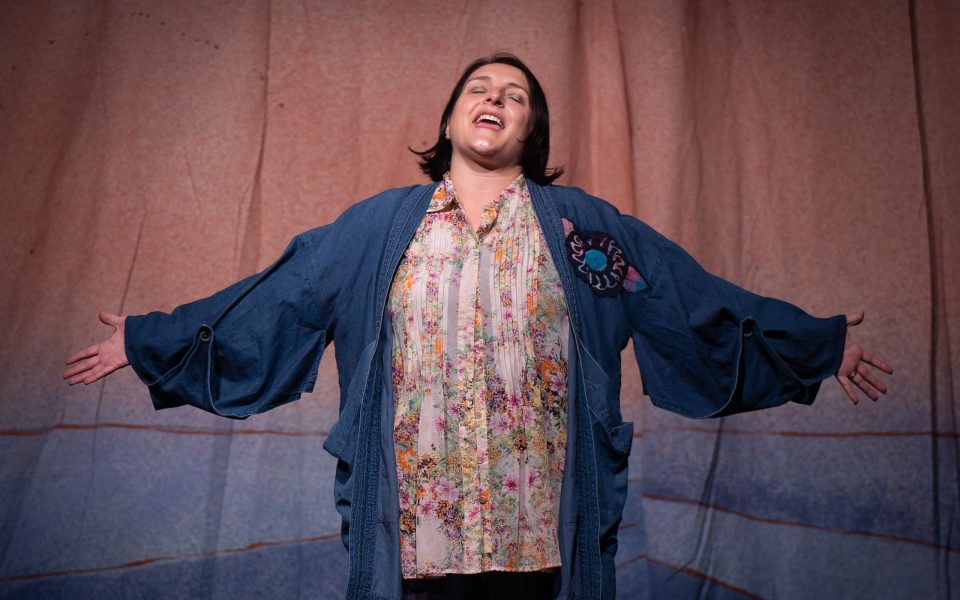Rhonda’s Rites of Passage runs through this weekend at the Mountcastle Forum inside the Milton Rhodes Center for the Arts in downtown Winston-Salem, with performances on Friday and Saturday evening and Sunday afternoon. Visit intothearts.org for more information.
Every hero’s journey is the same, according to Christopher Vogler, a 12-step process that’s the same for them all, from Odysseus to the Lion King.
The Hero’s Journey embarked upon by Rhonda Morgan Lee starts where they all do: In the ordinary world, which for Rhonda means her job at the dentist’s office, her well-meaning but bumbling husband, her bratty adult children, her ailing granny, her busybody friends.
But as the audience soon finds out, there’s more to her than she lets on.
The arc of Rhonda’s Rites of Passage, a production of the 40+ Stage Co. running through this weekend at the small theater in the Milton Rhodes Center for the Arts, actually begins years earlier, when the lead character turned down a promising acting scholarship to start a family in North Carolina. Rhonda gets the “Call to Adventure,” Stage 2 in the Hero’s Journey, in the form of another acting gig, an off-Broadway apprenticeship in New York City.

Playwright Grace Ellis admits to a drop of autobiography in the plot: She, too, had an opportunity to study theater for a year in New York when she was 50, though Ellis says she did not endure Stage 3 of the Hero’s Journey, “Refusal of the Call,” or Stage 6, “Tests, Allies, Enemies,” on her way to Hunter College back in the 1990s. But she did “Return with the Elixir,” Stage 12, in the form of a wealth of theater knowledge and a new mentor, Tina Howe, the award-winning playwright.
Ellis has written dozens of plays since then, most of them shorts, and a few of them brought to life in various formats, most often community theater. Rhonda’s Rites of Passage, she says, was finalized back in 2017 and performed exactly once before, in a workshop read-through with the Greensboro Playwrights Forum.
This is the first full staging of Rhonda’s Rites of Passage, in a modest, community-theater setting but with sophisticated staging and blocking. The backdrop of the set represents Rhonda’s subconscious, filled with random items and some other props that come into play as the story unfolds. Visible garment racks hold costume changes, which the actors often swap right on stage. A diverse ensemble cast, including local theater veterans Pam Berrins, Layla Grace and Patsy B. Hawkins, and UNCSA professor Geordie MacMinn, wrangle more than 15 roles. Lauren Rahill, as the lead, brings a large stage presence and strong vocal chops to the role.

Ellis’ classical training shines through in Rites, even beyond her adherence to the Vogler’s Hero’s Journey: There’s a musical number, some scene-in-scene work, a little bit of slapstick.
“They are calling it a comedy,” Ellis said, “but it’s not always funny.”
It also harkens back to another classic, A Doll’s House, a Norwegian play by Henrik Ibsen from 1879, about a woman, Nora, who abandons her family to find fulfillment in a male-dominated world — the original Gone Girl, though far more controversial in its time.
Both end at Stage 9, “Reward” — Rhonda preps the night before leaving for New York; Nora makes a fantastic exit from Torvald’s mansion.

There’s a line about Ibsen in the script, and the program references the sequel, A Doll’s House 2, from Lucan Hnath in 2017, in which Nora reckons with the family she abandoned 15 years earlier for her own Hero’s Journey.
Spoiler: It doesn’t go well.
The Hero’s Journey can be a messy one — see Stage 7, the “Innermost Cave” — but in Rhonda’s alternate universe, a happy ending is implied — at least for her. Things worked out for Ellis, too, who watched the premiere with her husband from the back row.
CORRECTION: An earlier version of this story misstated Grace Ellis’ age when she went to New York City. The correction has been made; TCB regrets the error.
Join the First Amendment Society, a membership that goes directly to funding TCB‘s newsroom.
We believe that reporting can save the world.
The TCB First Amendment Society recognizes the vital role of a free, unfettered press with a bundling of local experiences designed to build community, and unique engagements with our newsroom that will help you understand, and shape, local journalism’s critical role in uplifting the people in our cities.
All revenue goes directly into the newsroom as reporters’ salaries and freelance commissions.


Leave a Reply